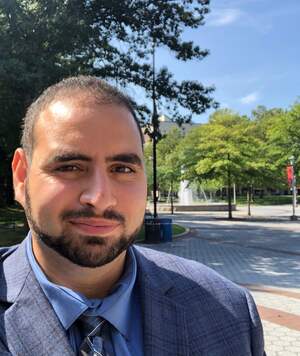2021–2 Mellon Fellow publishes work in Speculum

Mohamad Ballan, the Medieval Institutes Mellon Fellow for the academic year 2021–22, recently published an article in Speculum: A Journal of Medieval Studies: "Borderland Anxieties: Lisān al-Dīn ibn al-Khaṭīb (d. 1374) and the Politics of Genealogy in Late Medieval Granada." Speculum is widely regarded as the most prestigious journal in Medieval Studies. You can read the full article on Speculum's website.
Abstract: The article seeks to contribute to larger scholarly conversations about the construction and deployment of difference inmedieval borderland societies. It examines the ways in which genealogical notions of “Arabness” [ʿurūbiyyah], which expressed Islamic identity in terms of Arab lineage, structured the process of identity formation in Nasrid Granada (1232–1492). Through a close reading of the works of the Nasrid scholar-statesman Lisān al-Dīn ibn al-Khatị̄b (d. 1374) and his intellectual-political network, the article explores how Nasrid elites incorporated “Arabness” into the articulation of a local identity rooted in ethnic cohesion, religious exclusivity, and genealogical continuity. It argues that this constituted a particular strategy of identification that sought to differentiate Nasrid Granada fromits neighbors and demarcate the boundaries between al-Andalus, Christian Iberia, and the Maghrib, even as these regions came to be tied even more closely together through political, intellectual, social, and mercantile networks between the thirteenth and fifteenth centuries. The article concludes with a consideration of the “racialization of religion” and the manner in which Ibn al-Khatị̄b integrated ideas about environmental determinism and physiognomy, alongside genealogy, to represent the religious and cultural traits of the inhabitants of Granada as fixed, immutable, and heritable characteristics, the product of both lineage and environment. Through an examination of the racialized production of difference within the dynamic borderland context of late medieval Iberia, this article seeks to invite broader comparative approaches that integrate the medieval Islamic world into discussions about race, racialization, and ethnicity in the Middle Ages.
Professor Ballan is Assistant Professor of History at Stony Brook University. His research focuses on the intellectual, political and cultural history of the Mediterranean world, with a focus on late medieval and early modern Spain. His current book project, which builds upon manuscript research conducted in Spain, Morocco, the United States and the United Kingdom over the past decade, is tentatively titled Lord of the Pen and Sword: Sovereignty and History in the Nasrid Kingdom of Granada, and focuses on the intellectual, social and cultural history of the late medieval Western Mediterranean.